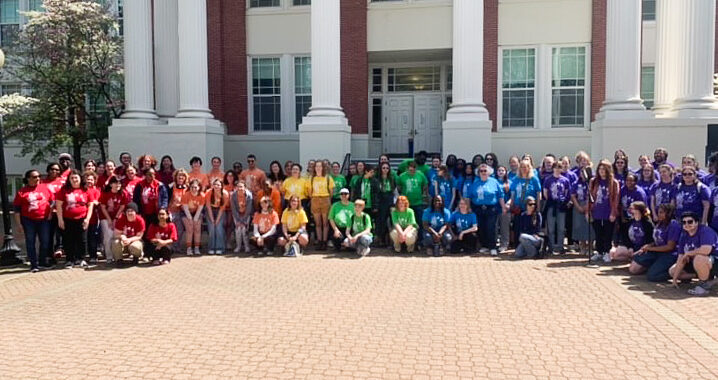Sustainability Major Paying-Off In Post-Graduate Job Search
6 min readBy BULLET STAFF
For more and more students, going green is paying off, as jobs in environmental sustainability thrive in spite of the bad economy.
According to the Bureau of Labor Statistics (BLS), employment in environmental science is “expected to grow much faster than the average for all occupations. Job prospects are expected to be favorable, particularly in state and local government.”
The BLS said that the number of environmental scientists and specialists in the U.S., 85,900 in 2008, is projected to surge 28 percent to 109,800 by 2018.The reported median salary of environmental scientists and specialists in 2008 was $59,750, and according to the National Association of Colleges and Employers, beginning salary offers in July 2009 for graduates with bachelor’s degrees in an environmental science averaged $39,160 per year.
Whenjunior Abbie Rogers started at the University of Mary Washington, she never imagined that she would become actively involved in environmentalism. Although she always considered herself an outdoorsy kid, she didn’t think of working to protect the environment until she attended a field trip with the Ecology Club to “Appalachia Rising,” a mass mobilization against mountaintop removal coal mining.
According to Rogers, seeing the damage that irresponsible coal mining and mountaintop removal had done so close to home was a wake-up call. She is now very involved with the Ecology Club on campus and works as a member of the student board of Greenpeace, the environmental organization. Rogers, who hopes to work in organizing for Greenpeace, is minoring in environmental sustainability.
Emily Sherman, a junior and president of UMW’s Ecology Club, also had no intention of studying environmental science when she started college. Her original plan was to double major in philosophy and political science.
After coming to UMW, she decided to major in environmental science and has worked as an intern at Friends of the Rappahannock, Virginia Recycling Markets Development Council, Chesapeake Climate Action Network and is currently working with the George Washington Regional Commission as the Energy Efficiency Program Intern. Sherman hopes to pursue a career in environmental organizing for a non-profit organization.
At UMW, there are currently 81 students majoring in environmental science and 16 minoring in environmental sustainability.
According to Mathew Wilkerson, director of institutional research, the number of students in the environmental science program varies from year to year and has both increased and decreased over the past 5 years.
Program sizes vary across Virginia. The University of Richmond currently has 30 students majoring and 20 students minoring in environmental sciences. George Washington University has 70 undergraduate students in the program. Virginia Polytechnic Institute and State University has upwards of 160 students, while the University of Virginia has roughly 150 and James Madison University has around 130.
Professor Thomas Thompson, head of the Department of Crop and Soil Environmental Sciences at Virginia Tech, said that the program has been steady over the past five years and he has noticed that it is beginning to increase.
Professor Stephen Leslie, chair of the Department of Geology and Environmental Science at JMU, has also noticed an increase in the environmental science major, saying that it has doubled in the last four years.
Michael Bass, a biology professor at UMW, is responsible for the creation of the school’s environmental science major.
When approached by former UMW President Prince Woodard, who served the university from 1974-1982 about starting an earth-science certification program. Bass suggested that the university would benefit more from the creation of a new environmental science major.
Woodard agreed under the terms that the earth-science studies would be included in the program. The first students of the environmental earth-science major graduated in 1983.
Now, UMW offers two routes for students interested in pursuing a major in environmental earth science: a natural science track and a social science track. Social science focuses on the political and economic issues, while natural science focuses more heavily on the scientific aspects.
Most recently, the department began to offer a minor in environmental sustainability. All of the programs are interdisciplinary and students take courses in subjects such as economics and mathematics.
Although there is currently no graduate program in environmental sciences at UMW, students often continue their education at other schools such as Duke, Virginia Tech and UVA.
According to UVA’s website, the school currently offers three graduate degree programs in environmental studies: Master of Arts, Master of Science and Doctorate of philosophy. George Mason University in Fairfax, Va., also offers a doctorate program and four different options for students who wish to continue their studies and earn their masters.
Brittney Baker graduated from UMW in 2009 with a major in environmental science. She continued to the Nicholas School at Duke University where, in two years, she earned her master’s in environmental management. While completing her master’s, she interned at Appalachian Voices, an environmental not-for-profit organization committed to protecting the Appalachian region while focusing on the environmental impact of coal mining.
At the start of Baker’s senior year at UMW, she hadn’t planned on attending graduate school. She changed her mind when employers at a Green Jobs fair she attended stressed that they liked to see a graduate education on an applicant’s resume.
Some UMW alumni have already been successful in using their studies in college to help them get jobs without attending graduate school. Tori Wong, who graduated this year, has found a way to make a living out of her passion for the environment.
When she first arrived at UMW, Wong was interested in the environment, but had a solid plan to major in communications and seek a job in the field of public relations. After getting involved with the Ecology Club, Wong realized that she wanted to be a part of the solution and created a special major in environmental sustainability.
Now, Wong works for Green Corps with the Sierra Club Beyond Coal Campaign. The group is working to shut down the largest on-campus coal plant in the country, at Michigan State University. She feels that organizing environmental campaigns across the country is the best way to help the environment and doesn’t plan to attend graduate school at the moment.
With a growing awareness of the need to actively preserve the environment, the job market in environmental sustainability is opening up opportunities that have not previously existed. Jobs have been created in federal, state and local governmental departments, as well as with private companies that are working to reduce their carbon footprint.
Public sector organizations that look for environmental science majors include the Environmental Protection Agency, the Department of the Interior, the Army Corps of Engineers, Natural Resource Conservation Service and Virginia Department of Environmental Quality, according to Virginia Tech’s website.
There are also many non-profit organizations that look to employ knowledgeable people, including the Chesapeake Climate Action Network, which is dedicated to fighting global warming in Maryland, Virginia. and Washington, D.C., the World Wildlife Foundation, one of the world’s foremost organizations in wildlife conservation, 350.org, which uses online campaigning to increase environmental activism around the globe, and the Sierra Club, a grassroots organization dedicated to environmental protection.
With the BLS estimating the national unemployment rate to be nine percent, most college students worry about the availability of jobs when they graduate. However, those wanting to go into sustainability, including Rogers and Sherman, are not too anxious.
“The great thing about the environmental movement, other than the fact that we’re trying to save the world, is that there are so many opportunities to take on leadership roles and gain experience,” said Sherman, “I’m hoping that it won’t be too hard to find a job when the time comes. The way that I see it… help is always needed.”
Rogers agreed. Despite the fact that non-profits are being hit hard in this economy, she believes that Greenpeace, and other environment-focused nonprofits, will survive and continue to thrive.
“A green agenda is coming to the forefront,” Rogers said. “All these things are coming together. A lot of things are changing. People are letting go of their apathy and, if this consciousness continues, I should be able to find a job because there is a lot of work to do.”
Bridget Balch, Lindsay Bennett and Rachel Berenbaum contributed to this report.











